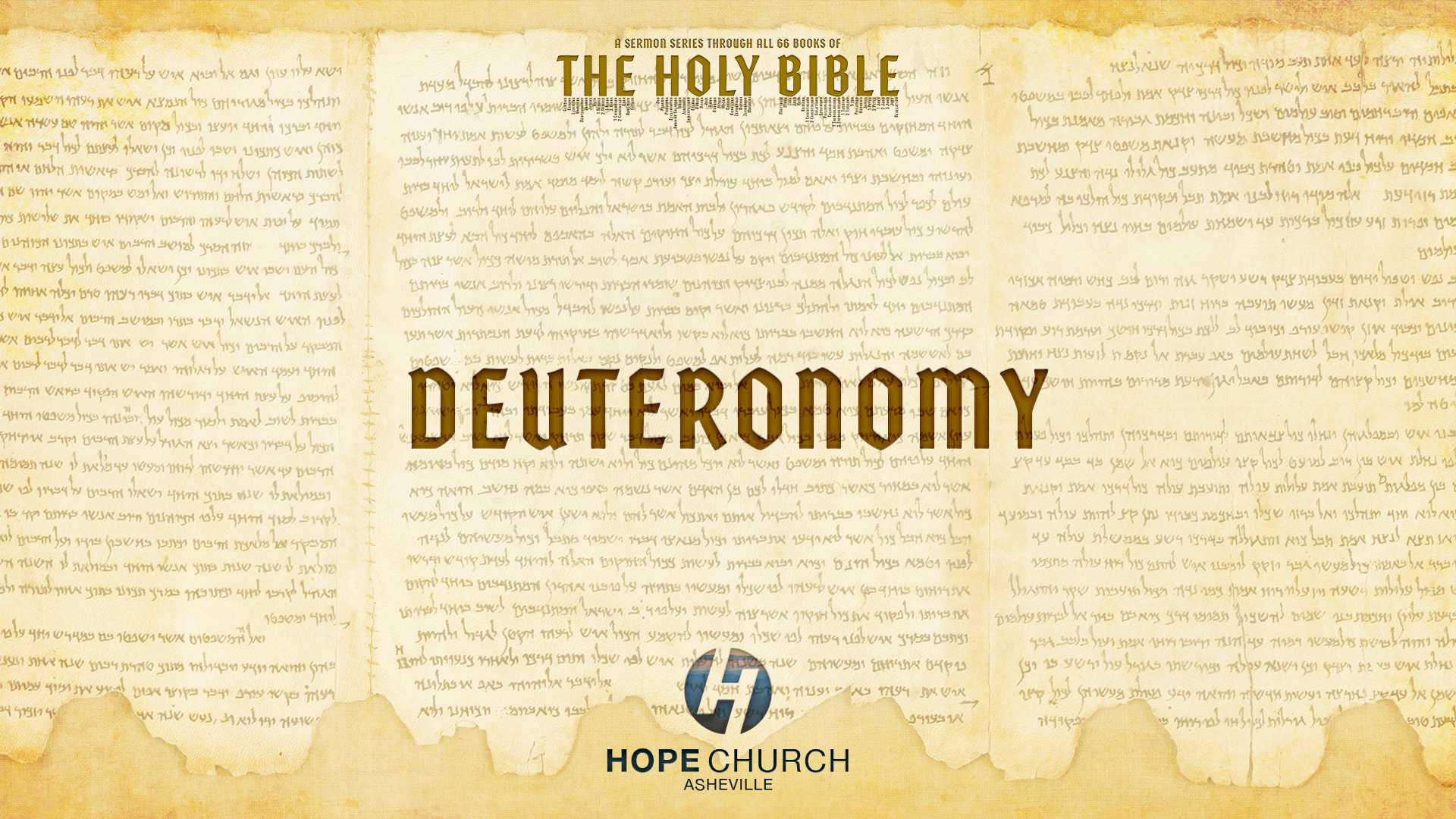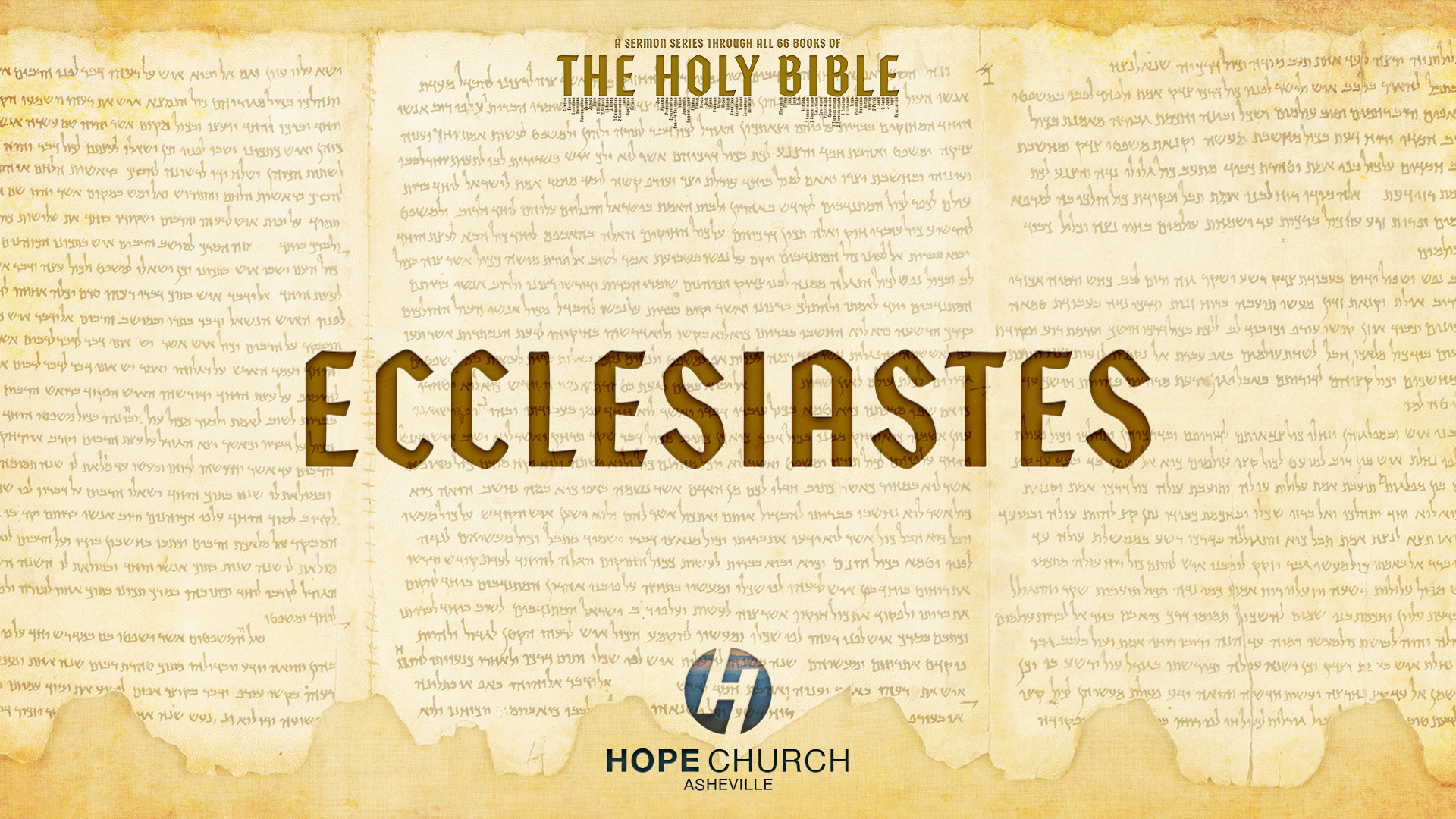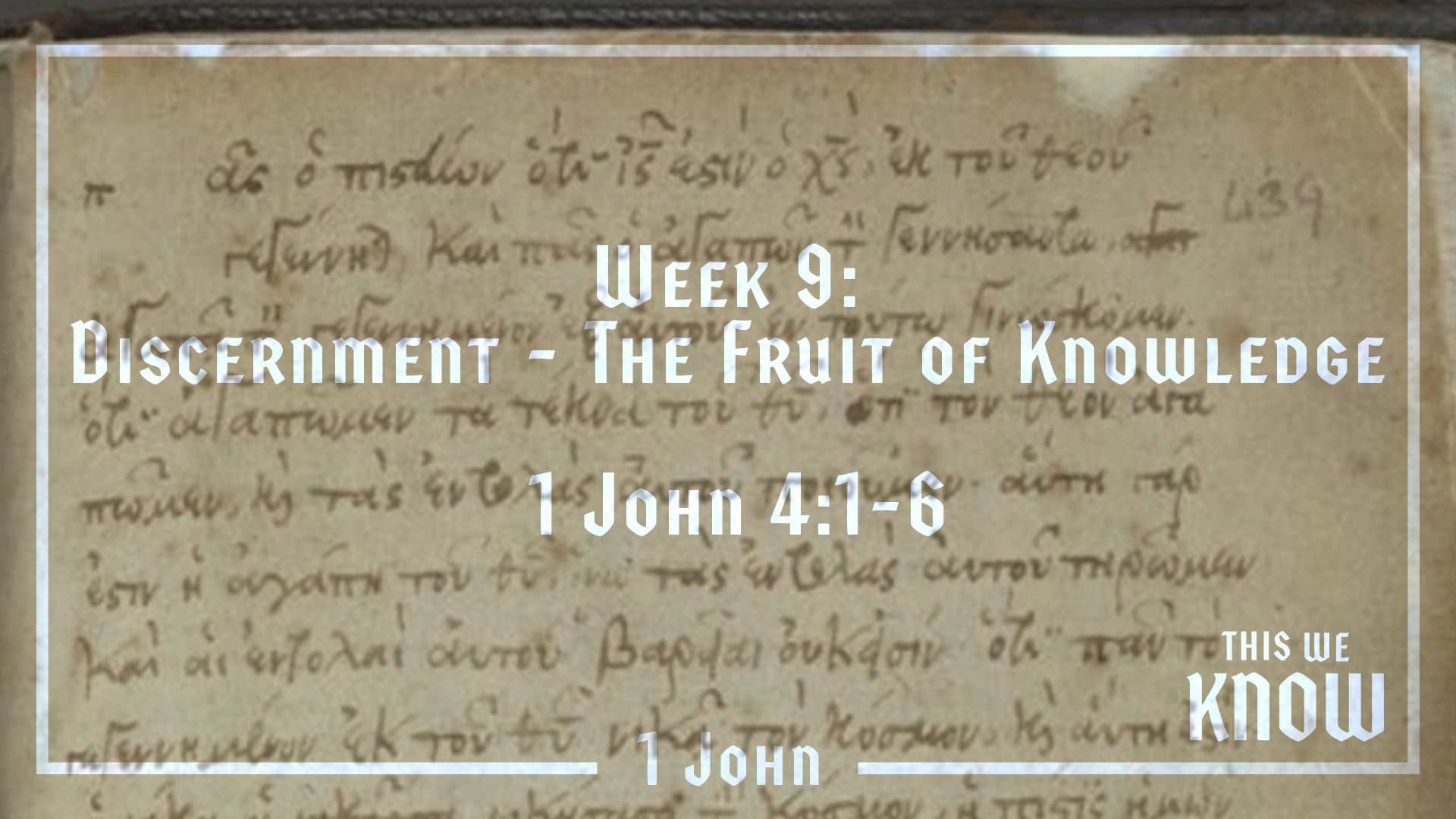Episode Transcript
Week 1: Scripture: The Foundation of Knowledge
Let’s open our Bibles together to the book of First John.
My family and I are thankful to be at Hope Church in Asheville, NC. God truly does answer prayer and He gives those who delight themselves in Him, the desires of their heart. In 2 Corinthians 2:4 the Apostle Paul says, “4 For I wrote to you out of much affliction and anguish of heart and with many tears”, speaking of the suffering he endured for the calling God had placed on his life. I am not the Apostle Paul, but the last few months have been crazy and I have endured affliction, anguish of heart (and back), and have shed many tears. It has been worth it all. We are home!
This morning we are starting a study through the book of First John, entitled, This We Know. I believe one of the foundational principles of making disciples is to teach the Bible in context, chapter by chapter and book by book. Teaching through books of the Bible is my passion and privilege as a pastor.
Before I read our text this morning, I want to give some background on this book. It was written by the Apostle John. This has been disputed, but there is solid evidence that I believe is overwhelmingly in favor of John being the author. Just to mention a few;
There are strong similarities between this letter and the Gospel of John — Themes: Light vs. Darkness, “Children” of God & “Children” of the Devil, and Those who know God also know his Son.
Much of the wording is exactly the same.
Gospel of John
“No one has seen God at any time” (1:18)
“He gave His only begotten Son” (3:16)
“He who believes in the Son has everlasting life; and he who does not believe the Son shall not see life” (3:36)
“he who hears My word and believes . . . has passed from death into life” (5:24)
1 John
“No one has seen God at any time” (4:12)
“God has sent his only begotten Son” (4:9)
“He who has the Son has life; he who does not have the Son of God does not have life” (5:12)
“We know that we have passed from death to life” (3:14)
Finally, the testimony of many early Church Fathers; Papias (who knew and was taught by the Apostle John), Polycarp (also a disciple of the Apostle John), and Irenaeus (disciple of Polycarp). All three confirm that John, the apostle of Jesus, is the author of First, Second, and Third John.
So, who was the Apostle John? John Macarthur describes him in this way, “…when we think of the Apostle John, we have images of somebody who’s somewhat meek, somebody who’s maybe almost effeminate because this is the way he has been depicted in so many medieval paintings. Somebody who is pale-skinned, quiet, depicted as sort of leaning on Jesus’ shoulder, looking up with some kind of a dove-eyed stare into the face of Christ. The image of John is a far cry from what he’s really like.”
(John and his brother James were called the Sons of Thunder! Remember when they wanted to call down fire from heaven to destroy a village and its inhabitants)
MacArthur continues, “John was a very outgoing and almost volatile person. In some ways, he is the very opposite of the way he is depicted - highly emotional, somewhat demanding. He is really a man for our times. His writing is very bold; it is very direct; it is very dogmatic. I don’t think there’s another New Testament writer that is as dogmatic as John is.
He is authoritative in his writing. He is committed to absolutes. He is black and white. He is a very exclusive preacher, much needed in a very inclusive time. These, as you know, are gray days in the life of the church. These are days when Christian thinking is loose, if there’s any Christian thinking at all.
It is accepting. It is tolerant. It is inclusive. It is uncertain. It is lacking in doctrinal clarity. It is lacking in dogmatism. It is lacking in conviction. It is given to tolerance; it is given to compromise. This is a perfect time to hear from John. This black and white, dogmatic, exclusive, absolute, authoritative apostle.
His epistles provide for us a powerful message for a compromising, conviction-less, open-minded, permissive, and liberal-thinking church. He’s really the perfect writer to address the church today.”
John is writing from the Church in Ephesus. Ephesus was a popular and wealthy center of business, commerce, culture, art, education, and architecture. Its religion was polytheistic and included rampant idolatry and ritual prostitution. They were spiritually, sexually, and politically corrupt. Sound at all familiar? If they had a slogan, it may have been, “Keep Ephesus Weird” or “Cesspool of Sin”. This is very relevant for us, today!
Which leads us up to the book of First John.
1 That which was from the beginning, which we have heard, which we have seen with our eyes, which we looked upon and have touched with our hands, concerning the word of life
Prayer: Thank you, Father for your word that reveals your truth. We ask that the Holy Spirit would open our hearts and minds to hear, understand, and believe your word. May Jesus be glorified and exalted in His church, this morning. Amen.
This We Know. The title of the sermon for today is, “Scripture: The Foundation of Knowledge” and we are covering 1 verse.
Do you realize how controversial it is to claim to know anything in our culture? This single verse contains enough truth to divide an entire city and it contains enough truth to save the entire world! John uses his words wisely and he is writing under the inspiration of the Holy Spirit. The powerful truth that John is addressing in this first verse is: Revelation.
1. Revelation.
- John is connecting his book to the Old Testament. (Genesis) In the beginning, God created…
- John is connecting it to the Gospels and other books of the New Testament that had already been written. (Gospel of John) In the beginning was the Word…
- What was in the beginning? God / Holy Spirit / Jesus —
These have been revealed to us! John saw Jesus.
- Revelation means to “unveil” or “uncover.” The process by which God makes Himself known to men.
- General revelation: Available to all people in all places.
Creation: Psalm 19:1-4 "The heavens declare the glory of God, and the sky above proclaims his handiwork. Day to day pours out speech, and night to night reveals knowledge. There is no speech, nor are there words, whose voice is not heard. Their voice goes out through all the earth, and their words to the end of the world." General revelation is universal and available to everyone, offering evidence of an all-powerful Creator God. Romans 1:20, "For his invisible attributes, namely, his eternal power and divine nature, have been clearly perceived, ever since the creation of the world, in the things that have been made. So they are without excuse."
Conscience: Romans 2:14 For when Gentiles, who do not have the law, by nature do what the law requires, they are a law to themselves, even though they do not have the law. 15 They show that the work of the law is written on their hearts, while their conscience also bears witness, and their conflicting thoughts accuse or even excuse them 16 on that day when, according to my gospel, God judges the secrets of men by Christ Jesus.
Reason - Through general revelation we can know that God Is Glorious, God Is Powerful, God Is Kind and Loving, God Is a Living Being, God Is a Moral Being, God is wise… You can know about God through general revelation, but you can not know Him. For that we need:
- Special Revelation:
Through Angels
Directly to Prophets and Apostles
Through Visions and Dreams
Scripture - Ps 19:7 The law of the Lord is perfect, reviving the soul; the testimony of the Lord is sure, making wise the simple; 2 8 the precepts of the Lord are right, rejoicing the heart; the commandment of the Lord is pure, enlightening the eyes; 9 the fear of the Lord is clean, enduring forever; the rules of the Lord are true, and righteous altogether. 10 More to be desired are they than gold, even much fine gold; sweeter also than honey and drippings of the honeycomb. 11 Moreover, by them is your servant warned; in keeping them there is great reward.
Christ - Jesus is God’s ultimate revelation. God became man. (This is what John is talking about in verse 1)
John 1:14 And the Word became flesh and dwelt among us, and we have seen his glory, glory as of the only Son from the Father, full of grace and truth. Colossians 1:13 He has delivered us from the domain of darkness and transferred us to the kingdom of his beloved Son, 14 in whom we have redemption, the forgiveness of sins. 15 He is the image of the invisible God, the firstborn of all creation. 16 For by him all things were created, in heaven and on earth, visible and invisible, whether thrones or dominions or rulers or authorities—all things were created through him and for him. 17 And he is before all things, and in him all things hold together. 18 And he is the head of the body, the church. He is the beginning, the firstborn from the dead, that in everything he might be preeminent. 19 For in him all the fullness of God was pleased to dwell, 20 and through him to reconcile to himself all things, whether on earth or in heaven, making peace by the blood of his cross.
❖ We Believe The Bible is God’s Revelation of Himself to mankind.
Connected to (flowing from) the truth of Revelation is Inspiration.
2. Inspiration
- Revelation is What Scripture is. (God reveals Himself to us through Scripture.) Inspiration is How Scripture was given to us.
- In our day, inspiration means a few different things. Beauty inspires us. Art inspires us. People inspire us. In Scripture it means God breathed. God “breathed out” his words into men who wrote them down using their words and personalities. OVER Three thousand eight hundred times the Bible declares, “God said,” or “Thus says the Lord” 4 The Bible is clear about what it is and what God and the authors of Scripture believed it was. OLD TESTAMENT 2 Kings 17:13-14 Yet the Lord warned Israel and Judah through all His prophets and every seer, saying, “Turn from your evil ways and keep My commandments, My statutes according to all the law which I commanded your fathers, and which I sent to you through My servants the prophets.” However, they did not listen, but stiffened their neck like their fathers, who did not believe in the Lord their God. Nehemiah 9:30 “However, You bore with them for many years, And admonished them by Your Spirit through Your prophets, Yet they would not give ear. Therefore You gave them into the hand of the peoples of the lands. NEW TESTAMENT 1 Thessalonians 2:13 And we also thank God constantly for this, that when you received the word of God, which you heard from us, you accepted it not as the word of men but as what it really is, the word of God, which is at work in you believers. 1 Corinthians 14:37 If anyone thinks that he is a prophet, or spiritual, he should acknowledge that the things I am writing to you are a command of the Lord.
2 Tim 3:16 All Scripture is breathed out by God and profitable for teaching, for reproof, for correction, and for training in righteousness,
- πᾶσα γραφὴ θεόπνευστος
Pasa Graphe Theopneustos
- All Scripture God-Breathed
-Verbal Plenary Inspiration.
Scripture carries God’s “full weight and authority.”
2 Pet 1:19 And we have the prophetic word more fully confirmed, (more than what? God speaking at transfiguration) to which you will do well to pay attention as to a lamp shining in a dark place, until the day dawns and the morning star rises in your hearts, 20 knowing this first of all, that no prophecy of Scripture comes from someone’s own interpretation. 21 For no prophecy was ever produced by the will of man, but men spoke from God as they were carried along by the Holy Spirit.
- We believe in the verbal inspiration: extending to the actual words, not just concepts
- We believe in the plenary inspiration: the entire Bible. This is the view of the OT writers, the prophets, Christ himself, his apostles, and the historic position/understanding of the church. This one belief will literally change your life and your destiny!
❖ We Believe The Bible is God’s very word, every word was breathed out by Him through human authors.
Inspiration demands Infallibility.
3. Infallibility - This speaks to the authority and enduring nature of the Bible.
To be infallible means that something is incapable of failing and therefore is permanently binding and cannot be broken. Peter said “the word of the Lord endures forever” (1 Pet. 1:23-25) and therefore its authority cannot be broken. When addressing a difficult passage, Jesus said, “the Scripture cannot be broken” (John 10:34-35).
Inspiration also demands Inerrancy.
4. Inerrancy - This means that the Bible is without error. It’s a belief in the “total truthfulness and reliability of God’s words” (Grudem, Systematic Theology, Inter-Varsity, 2004, 90). Jesus said, “Your word is truth” (John 17:17).
- BUT IS IT REALLY IMPORTANT? Yes, inerrancy is extremely important because: (1) it is attached to the character of God; (2) it is taught in the Scriptures; (3) it is the historic position of the Christian Church, and (4) it is foundational to other essential doctrines.
❖ We Believe The Bible is incapable of failing.
❖ We Believe The Bible is True and Without Error.
That is awesome, but let’s get practical, Christians. Since we believe in Revelation, Inspiration, Infallibility, and Inerrancy, we have do do something about it.
All of these demand Observation, Interpretation, and Application.
5. Observation: What does it say? We must read it! God is speaking.
6. Interpretation: What does it mean?
7. Application: What should I do about it? Obey it. Live it.
❖ We Believe The Bible should be studied regularly, understood correctly, and applied daily to our lives.
Conclusion:
If we don’t believe the Bible is God’s inspired, infallible, inerrant revelation to mankind, then we must surrender to this culture. We may as well, “eat, drink, and be merry for tomorrow we die”.
But, I am here to tell you this morning that I believe it. The true church of Jesus Christ believes it! The angels gathered around the throne of God believe it, and every demon in hell believes it.
Do you believe it? Are you willing to take God at His word and live your life for Him?
The Bible tells us the good news that we are made in God’s image. That every human is an image bearer of God. Every human possesses dignity, value, and worth. Every human deserves our respect regardless of what they believe. But, Scripture also tells us that we are sinners. We have been separated from God by our sin and we are in danger of judgment. That is why Jesus came. He was God in the flesh, He lived a perfect, sinless life, He died a sacrificial death to pay the price for our sin, and he rose from the grave on the third day offering salvation to all who will turn from their sin and believe in Him.
Do you believe that? Have you trusted to Jesus as your Lord and Savior? All who believe in Him will not perish, but have eternal life. Jesus offers you forgiveness of sin and reconciliation with God. Will you respond to the Gospel today?
Christians: We have a job to do. We must share the Gospel and make disciples.


